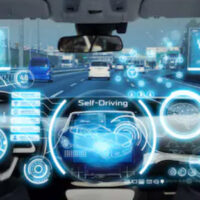According to New Study, Driverless Cars Won’t Ever Prevent Most Accidents, So Why Are We Ignoring the Warning Signs?

According to a new study published by the Insurance Institute for Highway Safety, even though approximately 94 percent of all car accidents are due to human error, autonomous vehicles can only prevent approximately one-third of them. This is because – although the vehicles can better identify hazards, as well as prevent accidents caused by certain conditions, such as human incapacitation – they still cannot necessarily react with enough time to prevent an accident, overcoming what the Institute refers to as “prediction errors.” In addition, the vehicles will have an even tougher time doing this if manufacturers give into customer pressure to make them faster and more convenient, prioritizing certain features over safety.
This explains why there have been a number of accidents involving autonomous vehicles that failed to swerve at the last minute to avoid an accident, even with human drivers behind the wheel – many of them involving Tesla vehicles. The third death linked to Tesla’s automation system involved a vehicle that failed to swerve and, instead, crashed into a semi-truck. According to the National Transportation Safety Board, flaws in its operational design allowed it to disengage from the driving task, and the car’s driver wasn’t paying attention to what was happening on the road, likely due to overreliance on the car’s automation. Sadly, these vehicles have not only crashed into other vehicles, but also fatally injured pedestrians as well.
Rhode Island’s Driverless Little Roady Shuttle
Rhode Island has already embraced the technology through its “Little Roady” shuttle service, consisting of six electric vehicles that navigate a five-mile loop in regular traffic and engage in 10 curbside stops along the way to pick up passengers, carrying approximately 150 people per day. Still, safety attendants can reportedly only control the cars approximately 30 percent of the time, and the state has reported nine non-injury incidents just since the program launched in the spring of 2019, mostly involving curb strikes and cars bumping AVs.
The cars have also engaged in other, somewhat concerning behavior, such as halting due to sunrise glare, as well as stopping due to vehicle exhaust ahead during a green light, for example. In addition, they evidently still do not feature air conditioning, which can present a number of health and safety issues for passengers, especially during heat waves. Still, the company that makes them predicts that they will be fully autonomous sometime in the 2020s.
Contact A Rhode Island Accident Injury Attorney If You Have Questions or Concerns
If you or a loved one has been hurt in an accident here in Rhode Island, whether that involves an autonomous or ‘regular’ vehicle, know that you are not alone. At Kiselica Law Firm, our experienced Providence car accident attorney is ready to provide you with the assistance you need to get you started on the path to recovery today. Contact our office today to find out more.
Resources:
forbes.com/sites/greggardner/2020/06/05/driverless-cars-wont-prevent-most-accidents-insurance-institute-study-finds/#2cdbaa276893
ecori.org/transportation/2019/8/2/little-roady-shuttle-reaches-milestone-hits-speedbumps
ttnews.com/articles/autonomous-vehicle-test-rhode-island-shows-promise-other-cities
https://www.klflaw.com/tesla-smart-summon-feature-already-causing-auto-accidents/
